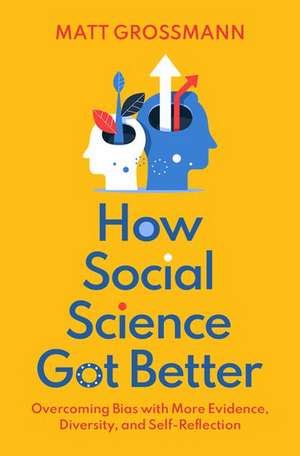How Social Science Got Better: Overcoming Bias with More Evidence, Diversity, and Self-Reflection
Autor Matt Grossmannen Limba Engleză Hardback – 11 noi 2021
Preț: 168.95 lei
Preț vechi: 180.21 lei
-6% Nou
Puncte Express: 253
Preț estimativ în valută:
32.33€ • 33.76$ • 26.70£
32.33€ • 33.76$ • 26.70£
Carte disponibilă
Livrare economică 14-20 martie
Preluare comenzi: 021 569.72.76
Specificații
ISBN-13: 9780197518977
ISBN-10: 0197518974
Pagini: 352
Dimensiuni: 160 x 236 x 33 mm
Greutate: 0.66 kg
Editura: Oxford University Press
Colecția OUP USA
Locul publicării:New York, United States
ISBN-10: 0197518974
Pagini: 352
Dimensiuni: 160 x 236 x 33 mm
Greutate: 0.66 kg
Editura: Oxford University Press
Colecția OUP USA
Locul publicării:New York, United States
Recenzii
Only a few decades ago, social scientists merely studied the problems of human society. Today we contribute to their solution—finding their causes; developing new methods, theories, and datasets; proposing and evaluating public policies; and building a science of human behavior. A change this monumental deserves this important book with Matt Grossmann as our expert tour director. Don't miss it.
Grossmann's brilliant book provides a nuanced, thoughtful analysis of the improving trajectory of social science resulting from bigger better data, a more diverse and interdisciplinary academy, methodological advances, and greater engagement with the real world. A book of major importance for practicing social scientists, as well as for the rest of the world who try to understand what social scientists do.
As social science has become more popular and public, it has also come under assault on many fronts. Yet in this compelling and provocative book, Matt Grossmann offers an important counter, arguing that the social sciences are stronger and more vibrant than they have ever been due to the increasing diversity of practitioners, growing humility and caution in offering grand claims, and vast expansions of available data and evidence. Most importantly, Grossmann argues that social science has both the incentive for, and multiple means of, correction and regulation that persistently push scholars in the direction of the truth. The book is sure to generate considerable debate and discussion, but its primary thesis is unquestionably hopeful: The social scientists are alright.
In this optimistic and self-reflective book, Grossmann reminds us that the social sciences are absolutely fundamental to understanding ourselves, our societies, our politics. He shows how the social sciences have turned their ample analytical powers to improving our techniques, data, and capabilities to improving our understandings. The book makes a strong case that social science has improved and that improvement can continue.
How Social Science Got Better is wide-ranging, accessible, fair-minded, and deeply informed—an indispensable guide to trends in the social sciences and how they make the claims they do. Covering topics from the reproducibility crisis to political polarization, it will be invaluable to a wide swath of social scientists who care about making their fields better—and to a broader public asking hard questions about the value of social science today.
Grossmann's brilliant book provides a nuanced, thoughtful analysis of the improving trajectory of social science resulting from bigger better data, a more diverse and interdisciplinary academy, methodological advances, and greater engagement with the real world. A book of major importance for practicing social scientists, as well as for the rest of the world who try to understand what social scientists do.
As social science has become more popular and public, it has also come under assault on many fronts. Yet in this compelling and provocative book, Matt Grossmann offers an important counter, arguing that the social sciences are stronger and more vibrant than they have ever been due to the increasing diversity of practitioners, growing humility and caution in offering grand claims, and vast expansions of available data and evidence. Most importantly, Grossmann argues that social science has both the incentive for, and multiple means of, correction and regulation that persistently push scholars in the direction of the truth. The book is sure to generate considerable debate and discussion, but its primary thesis is unquestionably hopeful: The social scientists are alright.
In this optimistic and self-reflective book, Grossmann reminds us that the social sciences are absolutely fundamental to understanding ourselves, our societies, our politics. He shows how the social sciences have turned their ample analytical powers to improving our techniques, data, and capabilities to improving our understandings. The book makes a strong case that social science has improved and that improvement can continue.
How Social Science Got Better is wide-ranging, accessible, fair-minded, and deeply informed—an indispensable guide to trends in the social sciences and how they make the claims they do. Covering topics from the reproducibility crisis to political polarization, it will be invaluable to a wide swath of social scientists who care about making their fields better—and to a broader public asking hard questions about the value of social science today.
Notă biografică
Matt Grossmann is Director of the Institute for Public Policy and Social Research and Professor of Political Science at Michigan State University. He is also Senior Fellow at the Niskanen Center and a Contributor at FiveThirtyEight. He has published analysis in The New York Times, The Washington Post, and Politico and hosts the Science of Politics podcast. He is the author or coauthor of many books, including Asymmetric Politics, Red State Blues, The Not-So-Special Interests, Artists of the Possible, and Campaigns & Elections, as well as dozens of journal articles.
